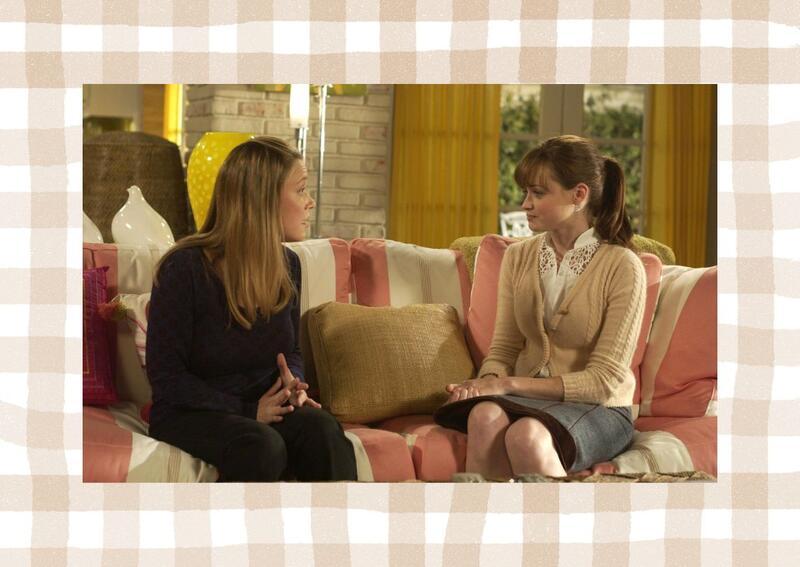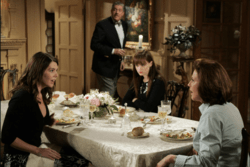Ambitious, Bold, and Overlooked: Unpacking Gilmore Girls' Paris Geller’s Jewish Identity
I love Gilmore Girls. I love entering the cozy world of Stars Hollow as Lorelai talks a mile a minute, Luke serves coffee, and Rory reads her pile of books. Over the years, I have watched the show all the way through at least three times, with a warm cup of tea (not coffee, which I’m sure would be to Lorelai’s chagrin). Almost everywhere I go, people will have strong opinions on who is the best boyfriend, which we can never agree on, or when exactly Rory became insufferable. (The correct answer to these questions are that Logan is the best boyfriend, but I also like Jess, and when Rory missed her Mom’s graduation to go to New York.) Still, there is one question that I have recently begun to think of more as I rewatch the show for my fourth time: When does Paris get to be Jewish, and when is her Judaism forgotten?
I have always adored Paris. She is one of Rory’s closest friends, and they go to both Chilton and Yale together. She is straight to the point, determined, and over all a force to be reckoned with. She is most importantly unabashedly herself. When she says, “I am not cut out to deal with people. I was made to be in a lab or an operating room or a bunker somewhere with a well-behaved monkey by my side,” I believe her. She is a woman who is allowed to be disagreeable, and, honestly, quite mean. In one scene when talking to a student she will tutor in the SAT, she calls the girl worthless and tells her she will have no future. Then, once her mom convinces her to take on her daughter, Paris has them both take an aptitude test to figure out if it is the girl's fault is genetics that is making the girl perform badly. In an essay from the Yale Daily News, Paris’s beloved newspaper, an actual Yale student, Ella Attell writes in We'll Always Have Paris, “The world is hard on ambitious women. Paris knows this truth all too well, sprinting after what she wants. While her body contorts in the pain of feminist realism, Rory tiptoes home with trophies, having never broken a sweat.”
This calls attention to two points. One: Paris is given considerably more depth than other women in the show when it comes to her struggles and failures. And secondly, Paris’ characterization is relatable to many other women watching this show. One of my favorite Paris moments is when she is rejected from Harvard, and she loudly proclaims in front of a large group of reporters that it was less likely for her to have sex than get her rejection letter. When watching this scene, I felt much more connected to Paris than I ever did to Rory, when she got into Princeton, Yale, and Harvard. Because of all of this, I have always had a soft spot for Paris, and I honestly admire her bold nature.
Still, as I began my cycle of rewatches, Paris's Jewish identity began to feel less developed to me. She is Jewish, but only when the show writers offhandedly mention it. One of the first times the audience hears about Paris being Jewish is when she wants to go to a dance but only has her bat mitzvah dress with menorahs on it to wear. As she tells Rory all of this in a fluster, one aspect becomes very clear. This is not an example of Paris’s Jewish identity; this is an example of Paris’s lack of style and social aptitude. In fact, the existence of this dress is mostly played off as a joke.
Furthermore, her Jewish identity is often forgotten about completely. Famously, Paris’ family are tenth generation Harvard alums. In the early seasons, Paris strives to get accepted to Harvard. This fact makes two unlikely assumptions: that the Gellers have lived in the US for ten generations, and that the Gellers would have been able to attend Harvard for all ten generations. Still, shouldn’t her Jewish identity have been mentioned here once? Harvard historically discriminated Jewish people in its admissions process, so what does it mean that Paris’ family are tenth generation alums? Is this even possible?
So where does this leave us? Paris’ character is not perfectly written, and there are many complaints that one could levee against her. In the end, though, how much does that matter? I still personally relate to her as a Jewish woman. I find her more compelling than other Jewish women in similar TV shows (think Monica and Rachel from Friends). While it is important to be critical of Jewish representation in the media, it is also important to acknowledge the effect Paris’ character has had on both Jewish and feminist women. In fact, I am not even the first JWA blog post to write about Paris. In How Paris Geller’s Jewishness Helped Me Understand Mine, Rena Lubin writes a piece about her Jewish identity, and Paris’s. In a BBYO article, The Top 10 Jewish Characters on TV, Paris ranks seventh.
As I lay on my bean bag once again to que up Gilmore Girls, I am left thinking not about the critiques of Paris’ character, but how I want to be like Paris. I want to be as driven, persistent, tenacious, and smart as Paris Geller. And I hope that other women also see Paris and run with this message.
This piece was written as part of JWA’s Rising Voices Fellowship.







